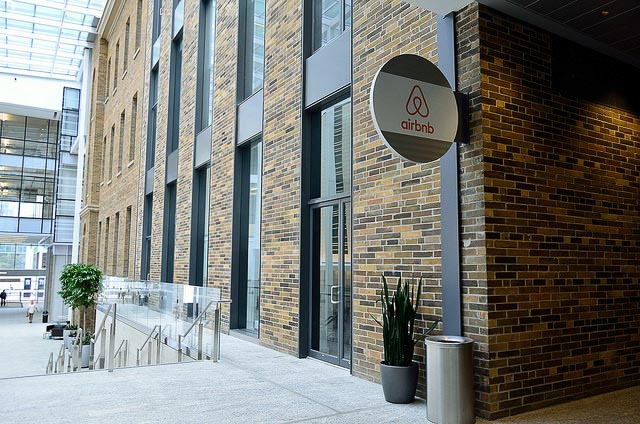The Super Bowl’s half-time star Lady Gaga chose a nearly 10,000-square-foot palace, with a spiraling staircase, resort-style pool and fitness center during her stay in Houston, rather than one of the city’s luxury hotels.
Such an offering -- this one going for $10,000 a night -- may not have been readily available when Houston last hosted the Super Bowl in 2004, several years before the San Francisco-based, couchsurfing company Airbnb became mainstream.
But this year, it seemed, interest from prospective Houston landlords surged. Houston, which lagged behind other markets that embraced Airbnb in recent years, saw listings increase 140 percent during the week of the Super Bowl. Hype surrounded this new company, and the event may have seemed like an opportunity to take advantage of an influx in visitors to Houston.
But, on many fronts, the expectations seem to have been far greater than reality, according to an analysis by Beyond Pricing, a data firm that analyzes Airbnb and Home Away.
The average price listed for rooms was roughly $150 to $200, far from the windfall expected by many hosts, who might have hoped to earn hundreds or even thousands of dollars per night. Beyond Pricing looked at the data behind the hype and found that rarely does the price gouge strategy pay off. The report found that occupancy rates actually dropped for Airbnb in Houston during Super Bowl week, compared to an average week in Houston, based of the oversupplied market. The trend is a familiar one.
In San Francisco, where Super Bowl L was held last year, hopes were dashed among those who hoped for a big pay day as well.
"With significant events in town, people will commonly put their homes on the market for $1,000 a night," said Tom Caton, cofounder of Airdna, a vacation rental analytics firm. "We've found these just don't frequently get booked."
Caton said his firm, which has headquarters in Denver and Barcelona, analyzed similar data on Airbnb with the Pope visited Philadelphia and for last year's Super Bowl.
"The numbers don't move the needle much," Caton said.
Interestingly, he said, the number of listings in Houston's Airbnb market has increased eight-fold in just the last two years. That's a much faster rate compared to other markets, and Caton speculated it might be because homeowners in the struggling oil industry are looking for supplemental income.
Though Airbnb did see some large homes rented for as much as $10,000 over four days, rates for listed properties dropped by 30 percent once the Dallas Cowboys fell out of contention, the company said in a statement. Among the hosts in Houston, half listed their homes for the first time.
The Beyond Pricing report found that the supply outpaced demand for Airbnb listings in Houston during the Super Bowl by more than double. Because of this, the occupancy rate actually dropped during Super Bowl week. Typically, the Houston region has about 3,000 homes listed, according to Airdna, from a mix of shared rooms, private rooms and entire homes.
Hotels may have fared better that homeowners. Houston's influx of visitors will have a lasting benefit for hoteliers over the course of the year, "increasing average occupancy by 2 percent and the average daily (room) rate by approximately $4.00 across thousands of rooms," according to a new CBRE Research report.
Predicting and quantifying the Super Bowl impact has proved a tricky business. Reports have varied on direct and indirect contribution from the event. How much was spent from tourists has not yet been calculated, but many city boosters say the event will make a lasting impact on Houston, regardless.
CBRE Research found the Super Bowl produced an estimated between $200 and $350 million in benefits for Houston, which includes investments in infrastructure, a surge in new restaurants, retail and hotels and influx of tourism dollars. This boost came at an opportune time when the region struggled with tens of thousands of job losses thanks to a dramatic fall in crude oil prices.
The increase in hotel occupancy could help Houston weather a difficult year for hotels, in particular. The oil price drop coincided with a surge of new hotel offerings underway, which created a perfect storm. The Houston area will have added 11,000 new hotel rooms by the end of this year, according to the most recent report from CBRE Hotels. This comes at a time when occupancy is dropping thanks to a decline in business tourism.
Downtown was the clear focus for the event. The city of Houston spent $1.5 billion on downtown, including renovations to the George R. Brown and Avenida Houston. This was on top of the 1,000-room Marriott Marquis, the new convention center hotel, opening in time for the week of the game.
The infrastructure development can benefit the city long-term, said Jason Draper, assistant professor at the University of Houston’s College of Hotel & Restaurant Management. He said the downtown activity will help draw more residents to the now more lively downtown. He said the event will provide a catalyst for more economic activity.
“I think it is all complementary,” Draper said. “I think Houston did a great job in that infrastructure development to leverage that to get more events and other areas… The city is getting more and more recognition.”


